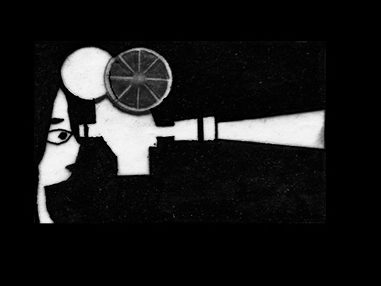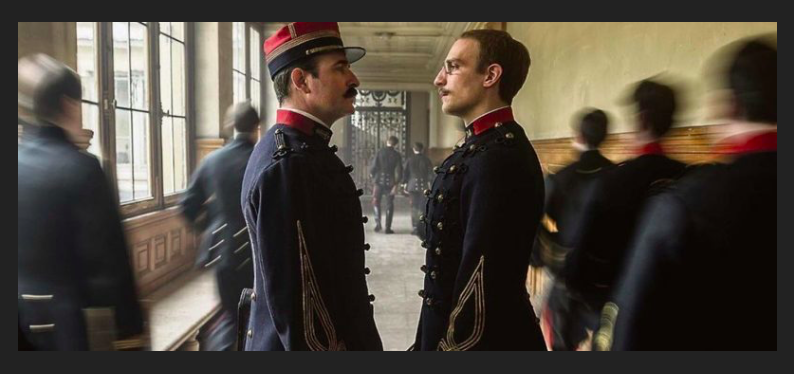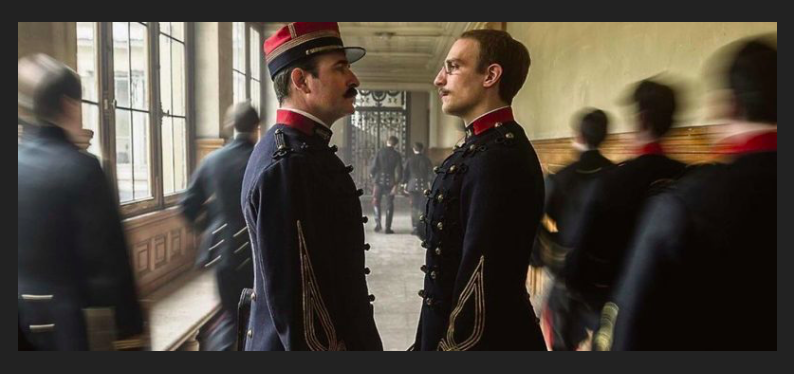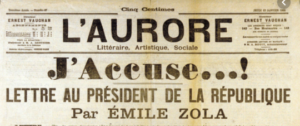From the very beginning of J’accuse, we are immersed in the violence of anti-Semitism of this time.
The anti-Semitism of an entire society led to the double conviction of an innocent man for dishonour, life imprisonment and prison, torture (no one spoke Alfred Dreyfus and at night he had his ankles chained when he was the only prisoner on a desert island).
The dishonor of France
An Officer and a Spy
Since Le Pianiste, Roman Polanski had not made us experience such a shock.
The direction is masterful.
Adapted from the novel D by Robert Harris (Fatherland’s author).
Everything is detailed. Anti-Semitic soldiers looking for a perfect culprit, an accusation file as thick as a sheet of paper, intelligence services close to amateurism, and men, one of whom, Marie-Georges Picquart, found out that an innocent man has been convicted and revealed the plot to Emile Zola.
Emile Zola was sentenced to one year in prison and a fine of 3000 francs after writing “J’accuse” in the newspaper L’Aurore on January 13th,1898, three years after Alfred Dreyfus‘ conviction and went to England before the sentence to be enforceable. His books were burned, his property seized and there was a resurgence of anti-Semitism (shop windows broken of shops which belonged to Jews, insults…). And four years after Alfred Dreyfus has been arrested, he was sentenced again in 1899 to ten more years of prison, then pardoned and finally cleared… But he never got the military rank and reparation he deserved. J’accuse movie is doing him justice.
Roman Polanski gave Jean Dujardin the role of his life. When he plays the Colonel Picquart, an anti-Semitic man, passionate about the army, and whom for truth matters above all, Jean Dujardin has never played so well.
From the antisemitism yesterday till today…
A pleiad of great French actors, the music composed by Alexandre Desplat, and the photography done by Pawel Edelman (director of photography on The Pianist) made this film a masterpiece and the best French film of this year. J’accuse also won the Grand Prix du Jury at the Mostra in Venice. Will the César be brave enough to give him a reward ?
Calls for a boycott for any reason whatsoever are an aberration, an attack on freedom of expression and the exposure of the truth, a France with a shameful past, a fierce anti-Semitism.
They only reinforce the message that the Roman Polanski wants to convey, the anti-Semitism of yesterday led to the Shoah, what can we expect when we look at anti-Semitism today?
As a feminist woman, I condemn the calls for a boycott of this film. It is essential. Go and see it before it’s too late.
Distribution (Wikipedia)
-
- Titre original français : J’accuse
- Italien : L’ufficiale e la spia
- International : An Officer and a Spy
- Réalisation : Roman Polanski
- Scénario : Robert Harris et Roman Polanski, d’après le roman D. de Robert Harris
- Premier assistant réalisateur : Hubert Engammare
- Direction artistique : Jean Rabasse
- Costumes : Pascaline Chavanne
- Photographie : Paweł Edelman
- Son : Lucien Balibar
- Montage : Hervé de Luze
- Musique : Alexandre Desplat
- Production : Ilan Goldman (Alain Goldman)
- Jean Dujardin : lieutenant-colonel Marie-Georges Picquart
- Louis Garrel : capitaine Alfred Dreyfus
- Emmanuelle Seigner : Pauline Monnier
- Grégory Gadebois, de la Comédie-Française : commandant Hubert Henry
- Hervé Pierre, de la Comédie-Française : général Charles-Arthur Gonse
- Wladimir Yordanoff : général Auguste Mercier
- Didier Sandre, de la Comédie-Française : général Raoul Le Mouton de Boisdeffre
- Melvil Poupaud : Me Fernand Labori, avocat d’Émile Zola au civil, puis du capitaine Dreyfus devant le 2e conseil de guerre
- Éric Ruf, de la Comédie-Française : colonel Jean Sandherr
- Mathieu Amalric : Alphonse Bertillon, expert graphologue
- Laurent Stocker, de la Comédie-Française : général Georges-Gabriel de Pellieux
- Vincent Perez : Me Louis Leblois, ami de jeunesse du lieutenant-colonel Picquart
- Michel Vuillermoz : lieutenant-colonel Armand du Paty de Clam
- Vincent Grass : général Jean-Baptiste Billot
- Denis Podalydès, de la Comédie-Française : Me Edgar Demange, avocat du capitaine Dreyfus devant les 1er et 2e conseils de guerre
- Damien Bonnard : Desvernine
- Laurent Natrella, de la Comédie-Française : commandant Ferdinand Walsin Esterhazy
- Bruno Raffaelli, de la Comédie-Française : juge Delegorgue
- Stefan Godin : général Darras (crédité Stéfan Godin)
- Pierre Poirot : greffier Vallecalle
- Luca Barbareschi : Philippe Monnier
- Mohamed Lakhdar-Hamina : Bachir
- Vincent de Bouard : Gribelin
- Philippe Magnan : procureur Brisset, président du 1er conseil de guerre
- Pierre Forest : le colonel Morel
- Jeanne Rosa : Martha Leblois
- Benoît Allemane : Georges Charpentier, éditeur d’Émile Zola
- Gérard Chaillou : Georges Clemenceau, éditorialiste à L’Aurore
- André Marcon : Émile Zola




